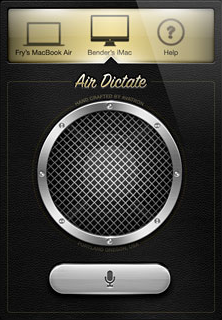
A unified interface makes it easier for the average user to start using a new app because certain design elements are universally consistent. But sometimes this control has a down side as well. It is impossible, to distinguish between poor design and innovation based purely on a simple set of rules.
Take, for example, the Air Dictate app from Avatron. Air Dictate allows iPhone 4S users to utilitze Siri's voice recognition as a text entry tool for Mac applications via Wi-Fi. It uses one of the simplest and most intuitive interfaces you will find in any app - for any OS.
Now, thanks to Apple's review process, Avatron has decided to discontinue development of Air Dictate. According to an email sent to The Unofficial Apple Weblog by Avatron CEO Dave Howell, Apple didn't like Avatron's use of the keyboard in a non-standard way.
Howell explained:
What we did was to hide the keyboard and text field entirely. We did that by putting another view in front of the keyboard window. When you press our big Start Dictation button, we map that to a tap on the little microphone button. But how? There's no public method to change the location of a tap event to some other location. The solution to that was the clever part of Air Dictate. We actually changed the position of the keyboard window so that its mic button is directly under whatever point you tapped. Then we move it back again after the event has passed through. Same thing for the Done button.

Apple reviewers complained that this approach may stop working at some point in the future. Howell questioned the validity of that reasoning, saying, "The cold hard fact is that every update of iOS is likely to break all of our apps for one reason or another."
That was not the only problem Apple reviewers had with the app, and the second point is perhaps the real key to this dispute. They didn't approve of Avatron's choice to use a custom microphone button in place of the standard iOS control:
Apple's suggestion was that we should throw away our custom interface (sacrificing its convenience for the blind and disabled, who would have trouble tapping the tiny mic button), and just throw up a standard keyboard. We don't want to do that so we're not planning to release any more updates to Air Dictate.
If there is a single, glaring weakness with Apple's approach to the iPhone, it is their insistence on control, even in the face of obvious improvements by outsiders. Yet features first added by third parties, mostly jailbreakers, have continually found their way into subsequent iOS releases.
An app store, Copy/Paste, wireless sync, Bluetooth keyboard support, and numerous other features were originally added by outside developers. Apple's policies resulted in those features requiring a jailbroken phone and the majority of iPhone owners waiting for Apple to formally recognize their usefulness months later.
One of Apple's goals seems to be control over innovation. But if there is one distinguishing feature of innovation, it's that it can't be controlled or scheduled, or limited to the developers of your choice. If there's a second common characteristic, it would be that innovation often defies the rules.
Rules cannot define innovation, but innovation often rewrites the rules. The more innovative something is, or the stricter the rules, the more likely this is. For a company built on rewriting the rules, Apple's apparent failure to recognize that is puzzling.
Written by: Rich Fiscus @ 24 Jan 2012 12:36
